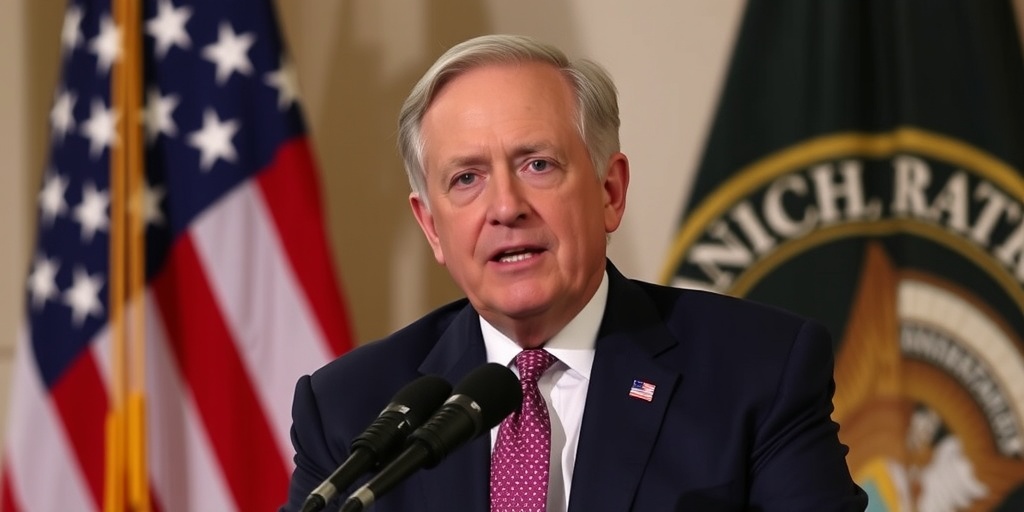Now Reading: Johnson’s Proxy Voting Fight Highlights House GOP’s Weak Grip
-
01
Johnson’s Proxy Voting Fight Highlights House GOP’s Weak Grip
Johnson’s Proxy Voting Fight Highlights House GOP’s Weak Grip

House Speaker Mike Johnson Faces Setback in Proxy Voting Controversy for New Parents
In a recent turn of events within the U.S. House of Representatives, Speaker Mike Johnson encountered a significant setback in his attempt to block a bipartisan initiative that would permit new parents in Congress to vote remotely after the birth of a child. This effort, which has gained traction among numerous House members, has underscored the limitations of Johnson’s authority and the growing discord within the Republican ranks.
The recent conflict sheds light on Johnson’s increasing reliance on former President Donald Trump to unify Republican lawmakers. Observers have raised concerns that in his eagerness to align the House with Trump’s directives, Johnson may be overlooking the preferences and tolerance levels of his fellow legislators. By disregarding the majority opinion of House members — a tactic historically fraught with peril for speakers — Johnson chose to engage in a contentious battle with uncertain outcomes.
After the vote, Johnson expressed disappointment, noting that nine Republicans sided with a unified Democratic bloc to sustain the proxy voting measure. "Disappointing result on the floor there," Johnson remarked, indicating his frustration with the outcome.
Despite Johnson stating that “96 percent of House Republicans voted against it,” this statistic failed to reflect the necessary near-unanimity he required within his party. This miscalculation revealed a significant gap in Johnson’s understanding of the dynamics within the House. Without Trump’s influence to act as a guiding enforcer, Johnson appears to wield diminished power over the divided Republican conference.
Brendan Buck, a former adviser to past Republican speakers John Boehner and Paul Ryan, articulated that the speaker’s role is to safeguard the institution but also to modernize it when necessary. He argued that sometimes, allowing the body to function and vote is the most beneficial path forward. “It’s clear people are ready for this change. This was not a battle that needed to be waged,” Buck added.
In trying to suppress a vote on a measure that a clear majority supported, Johnson incited discontent among even some Republicans who agreed with his opposition to proxy voting. Representative Greg Steube of Florida clarified that his "no" vote was rooted in concerns about process rather than the substance of proxy voting for new parents. He highlighted the importance of preserving a longstanding tool that empowers individual members to force votes when leadership blocks legislation.
Representative Anna Paulina Luna of Florida, a leading advocate for proxy voting, initiated this movement shortly after giving birth last year. Luna managed to garner support from a majority of House members, successfully meeting the threshold required to bring her proposal forward for consideration.
As Johnson’s rigid stance on proxy voting continues to stall legislative activities in the House, he has resorted to canceling votes altogether, instructing members to return home until further notice. This abrupt cancellation left Capitol Hill staff surprised and available for informal gatherings.
Looking ahead, proponents of the proxy voting resolution anticipate that Johnson will attempt to prevent their efforts next week. They expect him to link a measure to terminate the proxy voting resolution with a proposal to authorize a vote on the Republican budget plan, which would include Trump’s fiscal priorities. Johnson, when asked about these potential maneuvers, remained noncommittal, stating, "We’re talking about everything."
There has also been speculation that Johnson may consider raising the threshold for a discharge petition from a simple majority to two-thirds of the House, a move that would significantly dilute the power of individual lawmakers.
Some Republicans are baffled by Johnson’s choice of conflict. Representative Thomas Massie of Kentucky criticized the situation, pointing out that Congress was essentially paralyzed by a dispute over whether new parents in the House should have the ability to vote remotely. He expressed concern that such energy was not directed toward more pressing issues facing the country.
Johnson and his supporters maintain that any allowance for remote voting could lead to broader implications, fundamentally altering the nature of Congress as a deliberative body intended for in-person discussions and legislative action. They cited the expansion of Luna’s proposal, which initially allowed proxy voting for new mothers for a limited period but was later broadened to include new fathers and extended to 12 weeks.
In a social media statement, Johnson expressed that he empathized with the challenges faced by new parents in governance but reiterated his opposition to the proposed changes. He noted that the majority of the Republican conference was disappointed with the recent procedural vote, which had Democrats celebrating.
However, Representative Brittany Pettersen, a Colorado Democrat and advocate for the parental leave measure, expressed confidence in the eventual success of their resolution. While acknowledging the ongoing struggle, she expressed hope that Republican lawmakers would ultimately support their initiative.
Overall, the ongoing proxy voting debate has not only highlighted divisions within the Republican party but also raised critical questions about leadership, authority, and the future direction of legislative practices in Congress. As this conflict continues to unfold, it remains to be seen how Speaker Johnson will navigate the challenges ahead and whether he can rally his party around a cohesive strategy that addresses the needs of its members while adhering to the institution’s traditions.
Stay Informed With the Latest & Most Important News
Previous Post
Next Post
-
 01New technology breakthrough has everyone talking right now
01New technology breakthrough has everyone talking right now -
 02Unbelievable life hack everyone needs to try today
02Unbelievable life hack everyone needs to try today -
 03Fascinating discovery found buried deep beneath the ocean
03Fascinating discovery found buried deep beneath the ocean -
 04Man invents genius device that solves everyday problems
04Man invents genius device that solves everyday problems -
 05Shocking discovery that changes what we know forever
05Shocking discovery that changes what we know forever -
 06Internet goes wild over celebrity’s unexpected fashion choice
06Internet goes wild over celebrity’s unexpected fashion choice -
 07Rare animal sighting stuns scientists and wildlife lovers
07Rare animal sighting stuns scientists and wildlife lovers





















